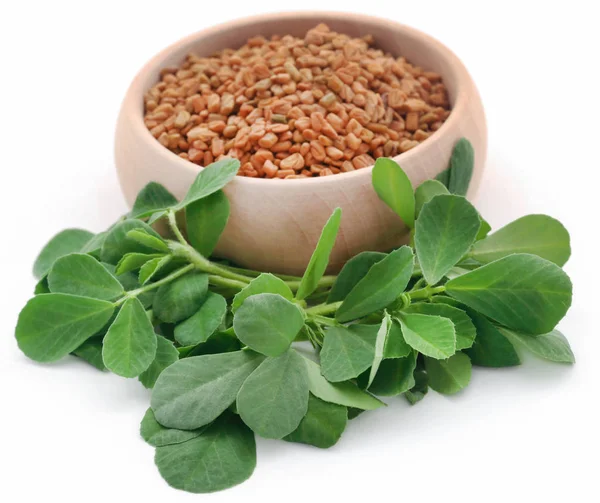As per old Indian wisdom passed from generations, If you take as many fenugreek seeds as per your age and chew them slowly every morning on an empty stomach, or in evening take with water, then the person will always remain healthy and active and will have less impact of diabetes, joint pain, blood pressure and other
some of the serious diseases.
There will be protection from many diseases etc. The ailments of old age (such as sciatica, knee pain, numbness of hands and legs, muscle strain, loss of ability to walk, frequent urination, dizziness, etc.) will not affect him. The person will live longer due to increase in vigor, radiance and energy.
Although fenugreek seeds are used in many ways for the treatment of different diseases, such as soaking fenugreek seeds and drinking its water, or sieving the soaked fenugreek seeds and drinking it, sprouting it and chewing it or extracting the juice and giving it, boiling it and drinking its water or eating it as a vegetable. Consuming it while preparing Indian Khichdi or Indian Kadhi, eating whole fenugreek seeds by chewing them in the morning and swallowing them with water at night, roasting them or making porridge or powder out of it and taking it with fresh water, making sweat laddu’s from fenugreek seeds and eating them, etc. A safe and good way is to make its decoction or tea and drink it.
Method of making fenugreek decoction or tea:
- Add five grams (one and a half teaspoon) fenugreek seeds (roughly ground) to 200 grams of water and let it boil on low flame.
- After boiling for about ten minutes, when 150 grams or (½ cup) of water remains, take the vessel down from the flame.
- When it is hot enough to drink, filter it through a clean cloth and drink it hot like tea.
- If a person cannot drink bitter decoction, then he can take it as tea by adding some hot milk and sugar to this decoction.
- In case of phlegm cough, chest pain and chronic heart disease, taking one or two spoons of honey mixed with slightly warm fenugreek decoction is especially beneficial, but while adding honey, the decoction should remain lukewarm and not hot.
- To make the decoction, if after keeping the fenugreek seeds soaked in water in a glass overnight. Then use same water to prepare decoction by boiling the soaked fenugreek seeds in the same water in the morning, then it will be prepared quickly and due to the hardness of the fenugreek seeds, the decoction will also be more effective.
- This decoction of Fenugreek (without adding anything to it) should be drunk twice a day, first thing in the morning about half an hour before breakfast and at night before sleeping.
- Drinking it continuously will prevent constipation because fenugreek seeds are especially anti-inflammation and digestive system improver.
Few points from old Indian texts:
(1) It is anti-inflammatory, expectorant, and anti-phlegm. Fenugreek expels the mucus, accumulated dirt stuck to the digestive organs, respiratory system, blood vessels, intestines, and inner skin (membrane) from the body and by purifying the internal organs, it reduces swelling and irritation of the organs. With the use of fenugreek, digestion process improves. Stool starts coming in proper bonded shape, stomach gets cleaned properly organs like liver become stronger and their dysfunction goes away due to which the body starts feeling energetic and strong.
(2) Fenugreek seeds is similar to ‘cod-liver oil’, hence fenugreek is a good alternative to fish oil for vegetarians and similarly it also helps in treating anemia, weakness, nerve diseases, It is very beneficial in knee pain, arthritis, rickets, weakness after infectious diseases, polyuria, diabetes etc.
(3) Apart from diseases of the digestive system like colic, dysentery, enlargement of spleen and liver, ulcer, colitis etc., diseases of the respiratory system like phlegmons cough, asthma, swelling in the respiratory organs, Consumption of fenugreek is beneficial in bronchitis, chronic chest diseases etc.
(4) Due to its ability to remove inflammation and swelling of organs and make them functional again, fenugreek helps in curing diseases like appendicitis, tonsils and sinusitis etc. and prevents them. It cures diseases of mouth, throat and tongue.
(5) It is beneficial in women’s menstrual disorders, leucorrhea, swelling in the uterus. Removes blockages in the flow of mother’s milk. Being rich in nutrients, fenugreek acts as a general tonic.
(6) Use of fenugreek reduces urine and blood sugar (diabetes), cholesterol level in blood decreases and high blood pressure is balanced and triglycerides are also controlled.
(7) Special Vitamin B-17 helpful in controlling cancer is also found, in specific quantities, in sprouted fenugreek seeds. And sprouted fenugreek juice has proven to be extremely beneficial for patients suffering from stomach ulcers, intestinal inflammation (colitis) etc.
(8) Fenugreek seeds are no less than a boon for people with phlegm and vata nature, yet it is important to take the following precautions while consuming fenugreek –
Precautions
(a) People with Pitta nature as per Ayurveda or those who have complaints of biliousness, leucorrhea, bloody piles, nosebleeds, bleeding in urine or bleeding from anywhere in the body should not use fenugreek, because fenugreek is hot and dry. It is not advisable to use fenugreek even in hot summer season.
(b) Those who do not like hot substances and whose body feels a burning sensation.
(c) The patient who is very weak and emaciated, suffering from dizziness and whose body has dried up to a mere cage of bones due to continuous metal corrosion.
General knowledge about Fenugreek: Fenugreek seeds, scientifically known as Trigonella foenum-graecum, have been used for centuries for their medicinal properties and culinary uses. These small, brownish seeds have a slightly bitter taste and a distinctive aroma. Here are some of the notable properties and potential health benefits associated with fenugreek seeds:
Anti-Inflammatory Properties:
Fenugreek seeds contain compounds with anti-inflammatory properties, which may help reduce inflammation in the body.
Antioxidant Content:
The seeds are rich in antioxidants, including flavonoids and polyphenols, which help neutralize free radicals and protect the body from oxidative stress.
Blood Sugar Regulation:

Fenugreek seeds may have a positive impact on blood sugar levels. Some studies suggest that fenugreek may help improve insulin sensitivity and lower blood sugar levels in individuals with diabetes.
Cholesterol Reduction:

Fenugreek has been associated with lowering levels of total cholesterol and triglycerides. The soluble fiber in fenugreek seeds may contribute to this effect.
Appetite Control and Weight Management:
Fenugreek seeds are rich in soluble fiber, which may help promote a feeling of fullness and contribute to weight management by reducing overall food intake.
Digestive Health:
The fiber content in fenugreek seeds may aid in digestion and help prevent constipation. It can also soothe gastrointestinal inflammation.
Breast Milk Production:
Fenugreek is often used by nursing mothers to help increase breast milk production. It is believed to stimulate milk production due to its galactagogue properties.
Menstrual Health:
Fenugreek seeds may help regulate menstrual cycles and alleviate symptoms of dysmenorrhea (painful menstruation) and premenstrual syndrome (PMS).
Testosterone Regulation:
Some studies suggest that fenugreek may have a positive impact on testosterone levels in men, potentially improving libido and sexual function.
Respiratory Health:
Fenugreek seeds may help alleviate symptoms of respiratory conditions such as asthma and bronchitis due to their anti-inflammatory properties.
Skin Health:
Fenugreek seeds may be used topically to soothe skin irritation and inflammation. They are sometimes included in skincare products for their potential benefits.
Heart Health:
The antioxidant and anti-inflammatory properties of fenugreek seeds may contribute to heart health by reducing the risk of cardiovascular diseases.
It’s important to note that while fenugreek seeds offer various potential health benefits, they should be consumed in moderation. Excessive intake may lead to side effects, and individuals with certain medical conditions or allergies should consult with a healthcare professional before incorporating fenugreek into their diet or using it for medicinal purposes. Additionally, pregnant women should exercise caution and seek medical advice before using fenugreek supplements.
Final Warning: Please consult your doctor before consuming Fenugreek seeds in any form.

1 thought on “Fenugreek seeds, a treasure of health!!”